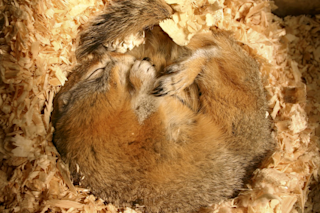This hibernating Arctic ground squirrel may look serene, but it’s under significant stress — at least, its body is. To survive the brutal winter, these critters slip into a deep sleep that can last for weeks at a time. Burrowed safely, they alternate between periods of low oxygen consumption and brief rewarming periods of normal consumption. The sudden surges can kick off a chain reaction in the body that produces hydrogen peroxide, resulting in excessive inflammation. According to a report in Critical Care Explorations, researchers last year identified a hidden hero that evolved to combat the stress: iodide, a form of iodine released by thyroid hormones. Increased levels of iodide in the blood convert harmful hydrogen peroxide into plain old oxygen and water. The discovery could someday lead to better treatments for humans with traumatic injuries.
Arctic Ground Squirrels Snuggle to Survive Winter
Discover how Arctic ground squirrel hibernation reveals a hidden hero: iodide that helps combat winter stress.

Newsletter
Sign up for our email newsletter for the latest science news
Marisa Sloan
Marisa is an assistant editor at Discover. She received her master’s degree in health, environment & science reporting from Northwestern University’s Medill School of Journalism. In a previous life, while earning a chemistry degree from UNC Greensboro, Marisa worked to prolong the therapeutic power of antitumor agents. Ask her about enzymes!View Full Profile
Published in:
More on Discover
Stay Curious
SubscribeTo The Magazine
Save up to 40% off the cover price when you subscribe to Discover magazine.
Subscribe













